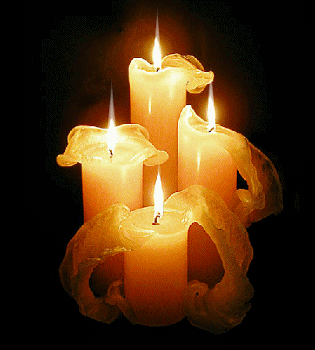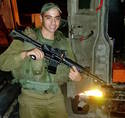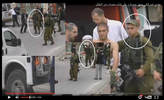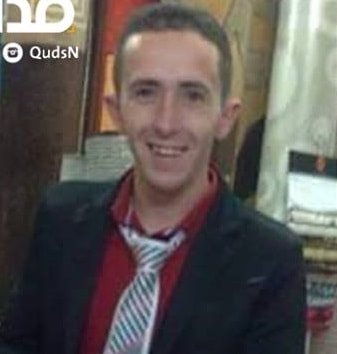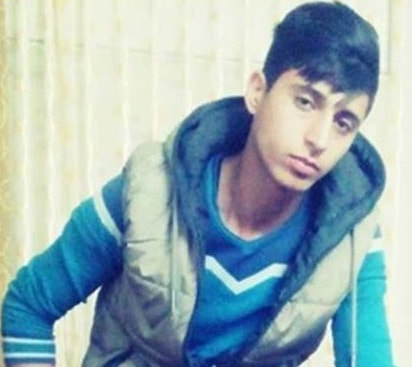29 aug 2016

Lt. M. told the court he considered wounded terrorist shot dead by Azaria in Hebron to still be dangerous, consequently assigning a soldier to guard him; this he did not tell the IDF police in his initial questioning.
Lieutenant M., who earlier Monday testified in defense of IDF Sgt. Elor Azaria, was confronted during cross-examination with inconsitencies arising from the different testimonies that he gave to the IDF Military Police's Criminal Investigation Division (CID) and the court. Azaria is on trial for manslaughter after shooting dead a wounded terrorist in Hebron.
Earlier in the day, Lt. M., who was a platoon commander at the time of the incident in March, claimed that the neutralized-but-still-alive terrorist was considered dangerous, and that's why he appointed a soldier to guard him, but when answering prosecutor Lt. Col. Nadav Wiesman's questions, admitted to not mentioning this to the CID.
Prosecutor Weisman: "The things you brought up today, like the fact that you told the company commander about the threat of a bomb—you didn't mention in your CID testimony."
Lt. M: "Right. There's no instance of that in my questioning. I also didn't say anything about the briefing I gave the soldier who guarded the terrorist about the threat of a bomb."
The prosecutor attempted to find out why Lt. M. claimed that he feared a bomb may be strapped to the terrorist but still approached them, and even touched them.
Prosecutor Weisman: "Why did you turn over the terrorists with your foot? Does this mean that, until you received a warning from a civilian, you weren't worried about a bomb?"
Lt. M: "That's not accurate… the concerns began to materialize and increased."
Prosecutor Weisman: "You're endangering all of your soldiers if you assume there's a bomb in the area."
Lt. M: "You can claim I operated unprofessionally, not well enough. All of the soldiers knew, all of the forces were briefed about this."
Prosecutor Weisman: "Why didn't you move people away from the area and warn them about a bomb?"
Lt. M: "You can't control this. It's all a mess. All sloppy. You don't know who belongs there and who doesn't. It's not so simple to say 'you go there, and you can come in.' I apparently failed in my duties because there was no monitoring of who went into the area and who did not."
Prosecutor Weisman: "Why didn't you send away the civilian who's standing next to the terrorist and photographing him? Why didn't you tell him that you think there's an explosive device on him and it's dangerous?"
Lt. M: "It's hard to distinguish who's a security or medical worker, and I – because of the weapon he was carrying – also recognized he was from the local civilian population's security contingency squad."
Prosecutor Weisman: "So he should be blown up by the bomb? Why didn't you send him away?
Lt. M: "There's no answer for why. I just didn't. Mistakes are always made, and that's part of the mistakes. I'm not here to say I handled it in the best way."
Prosecutor Weisman: "There's a quote here by the company commander, who said he was not informed of the risk of bombs."
Lt. M: "I told him about this. If he claims I didn't tell him, it's a lie."
Prosecutor Weisman: "A. (another witness from the area of the incident) said you didn't tell him anything about the bomb. What is your response?"
Lt. M: "I recall telling him."
Prosecutor Weisman: "So A. is lying as well?"
Lt. M: "That's what I remember."
Prosecutor Weisman: "In the moment of the shooting, you were pretty close to the attacker. Don't you think that contradicts your claim that he had a bomb on him? You, of all people, are standing next to him?"
Lt. M: "I didn't go for the terrorist, I went to update the company commander."
Prosecutor Weisman: "Why did you allow yourself and the company commander to stand close to the attacker?"
Lt. M: "In real time you don’t see things that way."
Prosecutor Weisman: "In real time you didn't think, at that point, about mortal danger. Because then you would have distanced the company commander and yourself from the terrorist."
Lt. M: "Correct. The fact that I wasn't thinking about mortal danger at that moment doesn’t mean it didn't exist."
At a certain point, the judge also asked to clarify the issue of Lt. M. updating the company commander about the danger of the terrorist having an explosive device on his person, saying, "We can see the company commander speaking and giving instructions and we don't see you telling him anything. Why?"
Lt. M: "Correct. I remember me speaking with the company commander, explaining to him, and giving him all of the details. I don't remember at which stage that was."
Judge: "The company commander told us that he received the information about the scene from the other platoon commander on the scene."
Lt. M: "I can't chronologically point out the moment. I am certain I told the company commander."
In his previous testimony, on behalf of the defense, Lt. M. stated that he had told the soldier guarding the terrorist that he was allowed to open fire if the terrorist made any sudden moves or inserted his hands into his clothes. He stated that the seriously wounded terrorist still posed a danger, and so he placed a soldier to guard him.
Lieutenant M., who earlier Monday testified in defense of IDF Sgt. Elor Azaria, was confronted during cross-examination with inconsitencies arising from the different testimonies that he gave to the IDF Military Police's Criminal Investigation Division (CID) and the court. Azaria is on trial for manslaughter after shooting dead a wounded terrorist in Hebron.
Earlier in the day, Lt. M., who was a platoon commander at the time of the incident in March, claimed that the neutralized-but-still-alive terrorist was considered dangerous, and that's why he appointed a soldier to guard him, but when answering prosecutor Lt. Col. Nadav Wiesman's questions, admitted to not mentioning this to the CID.
Prosecutor Weisman: "The things you brought up today, like the fact that you told the company commander about the threat of a bomb—you didn't mention in your CID testimony."
Lt. M: "Right. There's no instance of that in my questioning. I also didn't say anything about the briefing I gave the soldier who guarded the terrorist about the threat of a bomb."
The prosecutor attempted to find out why Lt. M. claimed that he feared a bomb may be strapped to the terrorist but still approached them, and even touched them.
Prosecutor Weisman: "Why did you turn over the terrorists with your foot? Does this mean that, until you received a warning from a civilian, you weren't worried about a bomb?"
Lt. M: "That's not accurate… the concerns began to materialize and increased."
Prosecutor Weisman: "You're endangering all of your soldiers if you assume there's a bomb in the area."
Lt. M: "You can claim I operated unprofessionally, not well enough. All of the soldiers knew, all of the forces were briefed about this."
Prosecutor Weisman: "Why didn't you move people away from the area and warn them about a bomb?"
Lt. M: "You can't control this. It's all a mess. All sloppy. You don't know who belongs there and who doesn't. It's not so simple to say 'you go there, and you can come in.' I apparently failed in my duties because there was no monitoring of who went into the area and who did not."
Prosecutor Weisman: "Why didn't you send away the civilian who's standing next to the terrorist and photographing him? Why didn't you tell him that you think there's an explosive device on him and it's dangerous?"
Lt. M: "It's hard to distinguish who's a security or medical worker, and I – because of the weapon he was carrying – also recognized he was from the local civilian population's security contingency squad."
Prosecutor Weisman: "So he should be blown up by the bomb? Why didn't you send him away?
Lt. M: "There's no answer for why. I just didn't. Mistakes are always made, and that's part of the mistakes. I'm not here to say I handled it in the best way."
Prosecutor Weisman: "There's a quote here by the company commander, who said he was not informed of the risk of bombs."
Lt. M: "I told him about this. If he claims I didn't tell him, it's a lie."
Prosecutor Weisman: "A. (another witness from the area of the incident) said you didn't tell him anything about the bomb. What is your response?"
Lt. M: "I recall telling him."
Prosecutor Weisman: "So A. is lying as well?"
Lt. M: "That's what I remember."
Prosecutor Weisman: "In the moment of the shooting, you were pretty close to the attacker. Don't you think that contradicts your claim that he had a bomb on him? You, of all people, are standing next to him?"
Lt. M: "I didn't go for the terrorist, I went to update the company commander."
Prosecutor Weisman: "Why did you allow yourself and the company commander to stand close to the attacker?"
Lt. M: "In real time you don’t see things that way."
Prosecutor Weisman: "In real time you didn't think, at that point, about mortal danger. Because then you would have distanced the company commander and yourself from the terrorist."
Lt. M: "Correct. The fact that I wasn't thinking about mortal danger at that moment doesn’t mean it didn't exist."
At a certain point, the judge also asked to clarify the issue of Lt. M. updating the company commander about the danger of the terrorist having an explosive device on his person, saying, "We can see the company commander speaking and giving instructions and we don't see you telling him anything. Why?"
Lt. M: "Correct. I remember me speaking with the company commander, explaining to him, and giving him all of the details. I don't remember at which stage that was."
Judge: "The company commander told us that he received the information about the scene from the other platoon commander on the scene."
Lt. M: "I can't chronologically point out the moment. I am certain I told the company commander."
In his previous testimony, on behalf of the defense, Lt. M. stated that he had told the soldier guarding the terrorist that he was allowed to open fire if the terrorist made any sudden moves or inserted his hands into his clothes. He stated that the seriously wounded terrorist still posed a danger, and so he placed a soldier to guard him.

As Sgt. Azaria's defense team summon witnesses to the dock for a second day, Lt. 'M' tells the court that 'there was crazy pressure after the incident. I also instructed my soldiers not to approach terrorist because the sappers had not checked him.'
Witness testimony was heard in the military court in Jaffa in the continuing trial of Sgt. Elor Azaria who is on trial for manslaughter after he was captured on camera shooting and killing already-neutralized Palestinian terrorist Abed al Fatah al-Sharif in Hebron.
At the center of Monday’s session was platoon commander from Azaria’s company, who told the court that he did not tend to the terrorist because there was “no clearance from the sappers” who were supposed to ensure that the terrorist was not wearing an explosive belt. “I also instructed my soldiers not to approach the terrorist so as not to endanger their lives,” the witness said. Lt. ‘M’ is the first military official to attest to Azaria’s version of events.
“There was mad pressure after the incident,” the witness continued. “Commanders and soldiers receiving calls from journalists were worried that something happened that wasn’t right. The company commander received instructions from the battalion commander that ever divisional commander discuss the matter with his soldiers and to explain how serious the incident was and to calm the atmosphere. The company, battalion and brigade commanders spoke to us while the military military Criminal Investigation Division (CID) was investigating soldiers. An instruction was given that the chief of staff wanted an investigation until 6am which is where everything started.”
“I looked at the second terrorist who was not killed, I rolled him over and saw that he had a knife in his hand. I distanced everyone from him and placed a soldier there to watch over him. It looked like something was out of proportion—two skinny terrorists and one of them looked ‘big’. I saw a large body on a skinny terrorist and a civilian shouted that there was a bomb. The suspicion was more than reasonable. It created another picture—a frightening picture. All the pieces started coming together and I shouted ‘get away from him. He might have a bomb.’”
Asked whether he believed that the terrorist constituted a life-threatening danger, Lt. ‘M’ replied, “As long as the incident has not finished you cannot say that there is no danger to your life. When terrorist are alive the danger exists. When the terrorist is on the floor that reduces the fear but the danger still exists. We had already had ongoing incidents. In one of them a commander didn’t cordon off the area and then there was a car-ramming attack after the shooting.” He added that “What I experienced in the actual field is different to the evidence provided by the company commander and the battalion commander.”
Lt. ‘M’ was critical of the testimony previously provided by Azaria’s company commaner Maj.Tom Na’aman, as well as his general conduct upon arrival at the scene. “I explained to Tom that I was worried that there was a bomb (on the terrorist) when he arrived at the scene. He didn’t talk much and was on his phone...The management of the area by Tom ignored my fears of a bomb. The only thing he said to me was ‘Put the soldiers here.’ I didn’t feel that Tom took the responsibility as he should have done.
As a commander I still felt I had to hand out the orders to our soldiers. The area was not handled well enough. In the month prior to the incident we had not practiced for a bomb scenario.”
Defense Minister Avigdor Lieberman passed comment on the ongoing trial during a tour of Bedouin villages in southern Israel. “It is worth remembering that in the State of Israel, and in all democratic countries, only the court can rule," Lieberman said. "A person is innocent until proven guilty. That includes Elor Azaria and the soldier (who is being questioned over shooting an unarmed Palestinian man).
It is worth remembering that people fight each day and each month against terror and terrorists and don’t always have a lawyer by their side when they go on a mission. That is why sometimes the judgement is right and sometimes wrong. But to create a situation in which every soldier needs to request a lawyer before a mission is not possible.
The proceedings were resumed after a month-long moratorium on Sunday when the judge heard testimony from Lt. Col. (res.) Eliyahu Liebman — who has served as the Chief Security Officer in Hebron for the last 22 years — in Azaria’s favor.
In the middle of Sunday's the proceedings, Azaria’s mother, Oshra, began crying out loud, “Where is the justice? Where is the justice?” before leaving the courtroom and being being told by the judge to calm down.
In total, the defense team is expected to summon 25 witnesses to the stand including three currently serving officers and former senior officials.
Witness testimony was heard in the military court in Jaffa in the continuing trial of Sgt. Elor Azaria who is on trial for manslaughter after he was captured on camera shooting and killing already-neutralized Palestinian terrorist Abed al Fatah al-Sharif in Hebron.
At the center of Monday’s session was platoon commander from Azaria’s company, who told the court that he did not tend to the terrorist because there was “no clearance from the sappers” who were supposed to ensure that the terrorist was not wearing an explosive belt. “I also instructed my soldiers not to approach the terrorist so as not to endanger their lives,” the witness said. Lt. ‘M’ is the first military official to attest to Azaria’s version of events.
“There was mad pressure after the incident,” the witness continued. “Commanders and soldiers receiving calls from journalists were worried that something happened that wasn’t right. The company commander received instructions from the battalion commander that ever divisional commander discuss the matter with his soldiers and to explain how serious the incident was and to calm the atmosphere. The company, battalion and brigade commanders spoke to us while the military military Criminal Investigation Division (CID) was investigating soldiers. An instruction was given that the chief of staff wanted an investigation until 6am which is where everything started.”
“I looked at the second terrorist who was not killed, I rolled him over and saw that he had a knife in his hand. I distanced everyone from him and placed a soldier there to watch over him. It looked like something was out of proportion—two skinny terrorists and one of them looked ‘big’. I saw a large body on a skinny terrorist and a civilian shouted that there was a bomb. The suspicion was more than reasonable. It created another picture—a frightening picture. All the pieces started coming together and I shouted ‘get away from him. He might have a bomb.’”
Asked whether he believed that the terrorist constituted a life-threatening danger, Lt. ‘M’ replied, “As long as the incident has not finished you cannot say that there is no danger to your life. When terrorist are alive the danger exists. When the terrorist is on the floor that reduces the fear but the danger still exists. We had already had ongoing incidents. In one of them a commander didn’t cordon off the area and then there was a car-ramming attack after the shooting.” He added that “What I experienced in the actual field is different to the evidence provided by the company commander and the battalion commander.”
Lt. ‘M’ was critical of the testimony previously provided by Azaria’s company commaner Maj.Tom Na’aman, as well as his general conduct upon arrival at the scene. “I explained to Tom that I was worried that there was a bomb (on the terrorist) when he arrived at the scene. He didn’t talk much and was on his phone...The management of the area by Tom ignored my fears of a bomb. The only thing he said to me was ‘Put the soldiers here.’ I didn’t feel that Tom took the responsibility as he should have done.
As a commander I still felt I had to hand out the orders to our soldiers. The area was not handled well enough. In the month prior to the incident we had not practiced for a bomb scenario.”
Defense Minister Avigdor Lieberman passed comment on the ongoing trial during a tour of Bedouin villages in southern Israel. “It is worth remembering that in the State of Israel, and in all democratic countries, only the court can rule," Lieberman said. "A person is innocent until proven guilty. That includes Elor Azaria and the soldier (who is being questioned over shooting an unarmed Palestinian man).
It is worth remembering that people fight each day and each month against terror and terrorists and don’t always have a lawyer by their side when they go on a mission. That is why sometimes the judgement is right and sometimes wrong. But to create a situation in which every soldier needs to request a lawyer before a mission is not possible.
The proceedings were resumed after a month-long moratorium on Sunday when the judge heard testimony from Lt. Col. (res.) Eliyahu Liebman — who has served as the Chief Security Officer in Hebron for the last 22 years — in Azaria’s favor.
In the middle of Sunday's the proceedings, Azaria’s mother, Oshra, began crying out loud, “Where is the justice? Where is the justice?” before leaving the courtroom and being being told by the judge to calm down.
In total, the defense team is expected to summon 25 witnesses to the stand including three currently serving officers and former senior officials.
28 aug 2016
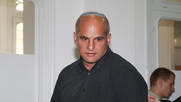
Lt. Col. Eliyahu Liebman
After more than a month, Sgt. Elor Azaria's defense team begin summoning key witnesses as proceedings continue; First witness accuses former defense minister of twisting his words to Azaria's detriment; 'It was a lie and false. I never said Azaria's actions were wrong...There are many incidents when terrorists are shot in the head by soldiers to make sure they pose no further threat and they are not brought to trial.'
After more than a month-long moratorium in the trial of Sgt. Elor Azaria—who was indicted for manslaughter after he was captured on camera in shooting the already neutralized Palestinian terrorist, Abed al Fatah al-Sharif, to death in Hebron—proceeding continued Sunday morning at a special military court in Jaffa.
Azaria’s attorneys began calling witnesses to the dock to corroborate Azaria’s claims thus far justifying his actions—namely that he fired out of fear of a bona fide threat posed by the terrorist.
Lt. Col. (res.) Eliyahu Liebman, who has served as the Chief Security Officer in Hebron for the last 22 years and has been the recipient of a medal of honor from former Defense Minister Moshe Ya’alon, was the first to be called to the witness box.
After stating his credentials, Libeman said, "There was an atmosphere where they tried putting words into my mouth in order to get the story straight." He then cited an example involving former Defense Minister Moshe Ya'alon (who still occupied the position during the incident) and attempted to debunk his alleged claims shortly after the incident that even he, (Liebman) had expressed his disapproval of Azaria’s actions.
“A few days after the incident I received a phone call from Ya’alon’s people in the Defense Ministry who spoke to me about what happened,” Liebman said. “At the end of the conversation (he told me) that Ya’alon told him that even the Chief Security Officer of Hebron thinks the shooting was not right. I clarified for the worker that that was a lie and was false. It was precisely the opposite. Ya’alon, I said, could contact me directly to clarify the matter but to this day he has not done so.”
Liebman claimed that the case was heavily influenced in the military ranks by the statements made Ya’alon condemning Azaria’s actions. “The second a defense minister speaks in this way, everybody in the army automatically falls into line. No one would dare to say otherwise. In my 27 years in service I have never seen any company or platoon commander express disagreement with the defense minister the moment he states his clear position in the media. It created an abnormal feeling among soldiers and commanders.”
Addressing the incident itself, Liebman said, “I arrived at the scene within minutes. There was an uncomfortable atmosphere that you could not say anything which differed from the version that they tried to create for the security services and the media...There was an atmosphere that you would be criticized if you held an opinion which conflicted with the agenda.”
Liebman added that, contrary to the impression given in the media, Elor's actions were actually standard practice: “As the Chief Security Officer in Hebron I did not instruct IDF soldiers on the procedures of opening fire but during incidents involving terrorists at which I was present, I saw with my own eyes that in every incident in which the terrorist attacked, the soldiers shot him in the chest until he was neutralized and then in the head to make sure the terrorist could not detonate a bomb. Those soldiers were never put put on trial,” he pointed out.
The witness then highlighted the fact that the terrorist was wearing a puffer jacket which could easily have been a bomb: “The terrorists was wearing a puffer jacket on a hot day and anyone who has experience knows that the coat is not just full of air but that there is a good chance that it is a bomb," he said.
He then drew the court's attention to the word “neutralized," saying that it was the cause of much confusion: “A ‘neutralized terrorist’ means: either he attempted to carry out an attack and was shot in the chest and killed and then shot in the head to make sure - as is taught in the IDF according to the rules of opening fire - or it means that the terrorist was checked by a sapper and was cuffed by the hands and feet.” In this case, Liebman concluded, “the terrorist was not professionally checked by the sapper and that endangered those who carried him.”
"There were two soldiers who did not act professionally during the incident. The terrorists were checked by them from close range,” continued Liebman. “If there was a medical team tending to the terrorist at the time of the incident, no one would have shot him.”
Liebman then turned to testimony against Azaria previously provided by Maj.Tom Na’aman, the latter's company commander: “We are indebted to Maj. Tom Na’aman for security in the area. "He is a good and appreciated individual but his statements were outrageous and ungrateful. To say the things he said about emergency medical teams in Hebron who risk their lives is ungrateful. I spoke to the company commander a day after the incident and it seemed that it had a profound effect on him personally,” he said before concluding, "The company commander failed in this instance."
Liebman also attempted to refute the testimony provided by Former Yehuda Brigade commander, Col. Yariv Ben-Ezra in june against Azaria. After furnishing praise on him for his service and contribution to preventing terror attacks, Liebman said “but he has also failed many times in his conduct in the area. Many Jews have been killed in the area. I cannot remain silent when these commanders, despite all their dedication, forsake an IDF soldier in the situation that has developed.”
After more than a month, Sgt. Elor Azaria's defense team begin summoning key witnesses as proceedings continue; First witness accuses former defense minister of twisting his words to Azaria's detriment; 'It was a lie and false. I never said Azaria's actions were wrong...There are many incidents when terrorists are shot in the head by soldiers to make sure they pose no further threat and they are not brought to trial.'
After more than a month-long moratorium in the trial of Sgt. Elor Azaria—who was indicted for manslaughter after he was captured on camera in shooting the already neutralized Palestinian terrorist, Abed al Fatah al-Sharif, to death in Hebron—proceeding continued Sunday morning at a special military court in Jaffa.
Azaria’s attorneys began calling witnesses to the dock to corroborate Azaria’s claims thus far justifying his actions—namely that he fired out of fear of a bona fide threat posed by the terrorist.
Lt. Col. (res.) Eliyahu Liebman, who has served as the Chief Security Officer in Hebron for the last 22 years and has been the recipient of a medal of honor from former Defense Minister Moshe Ya’alon, was the first to be called to the witness box.
After stating his credentials, Libeman said, "There was an atmosphere where they tried putting words into my mouth in order to get the story straight." He then cited an example involving former Defense Minister Moshe Ya'alon (who still occupied the position during the incident) and attempted to debunk his alleged claims shortly after the incident that even he, (Liebman) had expressed his disapproval of Azaria’s actions.
“A few days after the incident I received a phone call from Ya’alon’s people in the Defense Ministry who spoke to me about what happened,” Liebman said. “At the end of the conversation (he told me) that Ya’alon told him that even the Chief Security Officer of Hebron thinks the shooting was not right. I clarified for the worker that that was a lie and was false. It was precisely the opposite. Ya’alon, I said, could contact me directly to clarify the matter but to this day he has not done so.”
Liebman claimed that the case was heavily influenced in the military ranks by the statements made Ya’alon condemning Azaria’s actions. “The second a defense minister speaks in this way, everybody in the army automatically falls into line. No one would dare to say otherwise. In my 27 years in service I have never seen any company or platoon commander express disagreement with the defense minister the moment he states his clear position in the media. It created an abnormal feeling among soldiers and commanders.”
Addressing the incident itself, Liebman said, “I arrived at the scene within minutes. There was an uncomfortable atmosphere that you could not say anything which differed from the version that they tried to create for the security services and the media...There was an atmosphere that you would be criticized if you held an opinion which conflicted with the agenda.”
Liebman added that, contrary to the impression given in the media, Elor's actions were actually standard practice: “As the Chief Security Officer in Hebron I did not instruct IDF soldiers on the procedures of opening fire but during incidents involving terrorists at which I was present, I saw with my own eyes that in every incident in which the terrorist attacked, the soldiers shot him in the chest until he was neutralized and then in the head to make sure the terrorist could not detonate a bomb. Those soldiers were never put put on trial,” he pointed out.
The witness then highlighted the fact that the terrorist was wearing a puffer jacket which could easily have been a bomb: “The terrorists was wearing a puffer jacket on a hot day and anyone who has experience knows that the coat is not just full of air but that there is a good chance that it is a bomb," he said.
He then drew the court's attention to the word “neutralized," saying that it was the cause of much confusion: “A ‘neutralized terrorist’ means: either he attempted to carry out an attack and was shot in the chest and killed and then shot in the head to make sure - as is taught in the IDF according to the rules of opening fire - or it means that the terrorist was checked by a sapper and was cuffed by the hands and feet.” In this case, Liebman concluded, “the terrorist was not professionally checked by the sapper and that endangered those who carried him.”
"There were two soldiers who did not act professionally during the incident. The terrorists were checked by them from close range,” continued Liebman. “If there was a medical team tending to the terrorist at the time of the incident, no one would have shot him.”
Liebman then turned to testimony against Azaria previously provided by Maj.Tom Na’aman, the latter's company commander: “We are indebted to Maj. Tom Na’aman for security in the area. "He is a good and appreciated individual but his statements were outrageous and ungrateful. To say the things he said about emergency medical teams in Hebron who risk their lives is ungrateful. I spoke to the company commander a day after the incident and it seemed that it had a profound effect on him personally,” he said before concluding, "The company commander failed in this instance."
Liebman also attempted to refute the testimony provided by Former Yehuda Brigade commander, Col. Yariv Ben-Ezra in june against Azaria. After furnishing praise on him for his service and contribution to preventing terror attacks, Liebman said “but he has also failed many times in his conduct in the area. Many Jews have been killed in the area. I cannot remain silent when these commanders, despite all their dedication, forsake an IDF soldier in the situation that has developed.”
20 aug 2016
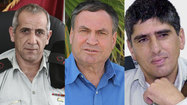
L to R: Dan Biton, Uzi Dayan, Shmuel Zakai
Elor Azaria’s defense team gears up for battle, issuing subpoenas for 25 witnesses, including two officers from the Kfir Brigade who were in Hebron at the time of the incident; Brig. Gen. (res.) Shmuel Zakai, who left the IDF after a public confrontation with then Chief of Staff Moshe Ya’alon, will also testify in defense of Azaria.
The trial of Sgt. Elor Azaria, who is accused of shooting an unarmed Palestinian terrorist who had already been neutralized, is due to reconvene next week. The Defense will be given a substantial boost as it plans on calling to the stand 25 witnesses. Two of them will be junior officers from the Kfir Brigade who were in Hebron on the day of the incident.
The two officers were Initially slated to testify for the prosecution, but the prosecution decided to forgo their testimonies. Azaria’s team of defense lawyers, which includes Eyal Beser Glick and Ilan Katz, will try to retrieve information from their testimonies that would back Azaria’s version of the events. Regarding his trial, Azaria has been quoted as saying that “The heads of the IDF and the minister of defense (referring to former minister Moshe “Bogey” Ya’alon) threw me to the dogs.”
Ret. Maj. Gen. Uzi Dayan will be another witness for the Defense. Dayan served as deputy IDF chief-of-staff and head of the Israeli Central Command in the late 90s, but retired when the Second Intifada broke out.
The two officers called upon by the Defense will be the only current members of the IDF who will be testifying in Azaria’s favor. They will be joined by former Gaza Division Head and ret. Brig. Gen. Shmuel Zakai, who was discharged from the army 12 years ago after then Chief-of-Staff Ya’alon accused him of leaking military information to the political echelon.
Ret. Maj. Gen. Dan Biton will also testify for Azaria. After serving as the Head of the Technology and Logistics Directorate, Biton left two years ago in response to not being promoted further. He had recently came public with his support of Azaria in Ynet’s Hebrew edition.
Those close to Azaria, who is currently held under open arrest at a military base in the center of Israel, worry that the IDF will try to pressure the two officers due to testify in his defense as the dates of their testimonies approach.
Elor Azaria’s defense team gears up for battle, issuing subpoenas for 25 witnesses, including two officers from the Kfir Brigade who were in Hebron at the time of the incident; Brig. Gen. (res.) Shmuel Zakai, who left the IDF after a public confrontation with then Chief of Staff Moshe Ya’alon, will also testify in defense of Azaria.
The trial of Sgt. Elor Azaria, who is accused of shooting an unarmed Palestinian terrorist who had already been neutralized, is due to reconvene next week. The Defense will be given a substantial boost as it plans on calling to the stand 25 witnesses. Two of them will be junior officers from the Kfir Brigade who were in Hebron on the day of the incident.
The two officers were Initially slated to testify for the prosecution, but the prosecution decided to forgo their testimonies. Azaria’s team of defense lawyers, which includes Eyal Beser Glick and Ilan Katz, will try to retrieve information from their testimonies that would back Azaria’s version of the events. Regarding his trial, Azaria has been quoted as saying that “The heads of the IDF and the minister of defense (referring to former minister Moshe “Bogey” Ya’alon) threw me to the dogs.”
Ret. Maj. Gen. Uzi Dayan will be another witness for the Defense. Dayan served as deputy IDF chief-of-staff and head of the Israeli Central Command in the late 90s, but retired when the Second Intifada broke out.
The two officers called upon by the Defense will be the only current members of the IDF who will be testifying in Azaria’s favor. They will be joined by former Gaza Division Head and ret. Brig. Gen. Shmuel Zakai, who was discharged from the army 12 years ago after then Chief-of-Staff Ya’alon accused him of leaking military information to the political echelon.
Ret. Maj. Gen. Dan Biton will also testify for Azaria. After serving as the Head of the Technology and Logistics Directorate, Biton left two years ago in response to not being promoted further. He had recently came public with his support of Azaria in Ynet’s Hebrew edition.
Those close to Azaria, who is currently held under open arrest at a military base in the center of Israel, worry that the IDF will try to pressure the two officers due to testify in his defense as the dates of their testimonies approach.
31 july 2016
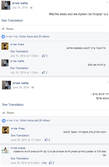
In Facebook posts from 2014, soldier accused of manslaughter after shooting dead wounded terrorist in Hebron calls the PM 'fa**ot', while his mother urges 'Enough with being humane, if need be we need to kill women and children as well.'
Facebook posts from 2014 made by Sgt. Elor Azaria, in which he curses Prime Minister Benjamin Netanyahu, have recently resurfaced online.
Azaria, who is facing manslaughter charges after shooting dead a wounded terrorist, expressed his anger at the prime minister's decisions during Operation Protective Edge. "Bibi, you fa**ot, why a ceasefire? Hit them hard!!!" Azaria wrote on July 15, while the 50-day war was still ongoing.
His father, Charlie Azaria, who received a phone call of support from Netanyahu after the Hebron shooting incident, agreed with his son, saying "Well done, you have to hit them really hard!"
"Yes, kill them all," Azaria agreed.
In another post from June 30 of that year, Azaria, who was still in high school at the time, declared "Kahane was right!" referring to Meir Kahane, a radical right-wing rabbi who was barred, along with his followers, of holding public office due to his extremist views against Arabs.
Azaria's mother Oshra responded to the post, saying "Death to anyone who hurts Jews. Enough with being humane, if need be we need to kill women and children as well, starting with (Zoabi)."
Screenshots of the two posts made the rounds on social media on Saturday night.
The military prosecution has, in the past, considered using these posts in their case against him, but eventually decided against it.
Sources close to the soldier said in response that "this is recycling of things that were posted in the past, which are not relevant to the trial, and is done to hurt Elor. When these posts were written out of pain during Protective Edge, (Elor) was still a teenager, not a soldier yet.
The Azaria family has a lot of respect to Mr. Netanyahu. Those who are running this despicable campaign against a combat soldier in the IDF are the same people who embrace and offer condolences to families of murderous terrorists. The people of Israel support the soldier and no post will change that."
Facebook posts from 2014 made by Sgt. Elor Azaria, in which he curses Prime Minister Benjamin Netanyahu, have recently resurfaced online.
Azaria, who is facing manslaughter charges after shooting dead a wounded terrorist, expressed his anger at the prime minister's decisions during Operation Protective Edge. "Bibi, you fa**ot, why a ceasefire? Hit them hard!!!" Azaria wrote on July 15, while the 50-day war was still ongoing.
His father, Charlie Azaria, who received a phone call of support from Netanyahu after the Hebron shooting incident, agreed with his son, saying "Well done, you have to hit them really hard!"
"Yes, kill them all," Azaria agreed.
In another post from June 30 of that year, Azaria, who was still in high school at the time, declared "Kahane was right!" referring to Meir Kahane, a radical right-wing rabbi who was barred, along with his followers, of holding public office due to his extremist views against Arabs.
Azaria's mother Oshra responded to the post, saying "Death to anyone who hurts Jews. Enough with being humane, if need be we need to kill women and children as well, starting with (Zoabi)."
Screenshots of the two posts made the rounds on social media on Saturday night.
The military prosecution has, in the past, considered using these posts in their case against him, but eventually decided against it.
Sources close to the soldier said in response that "this is recycling of things that were posted in the past, which are not relevant to the trial, and is done to hurt Elor. When these posts were written out of pain during Protective Edge, (Elor) was still a teenager, not a soldier yet.
The Azaria family has a lot of respect to Mr. Netanyahu. Those who are running this despicable campaign against a combat soldier in the IDF are the same people who embrace and offer condolences to families of murderous terrorists. The people of Israel support the soldier and no post will change that."
